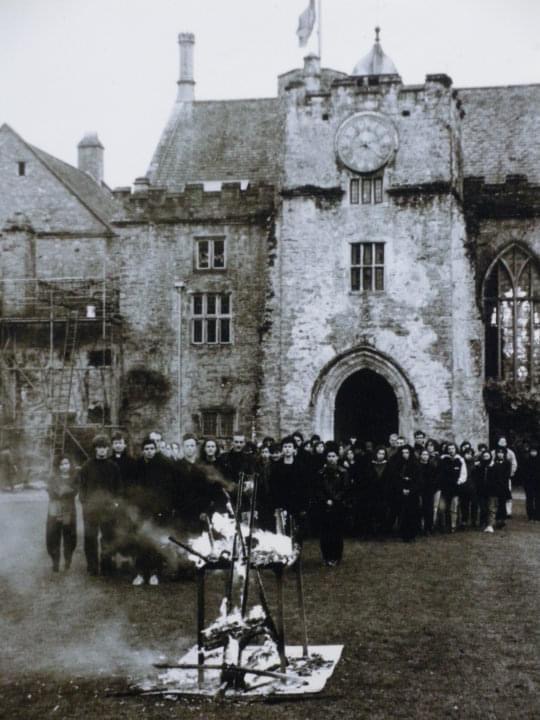The closing of the Art & Social Context course at Dartington College of Arts is an often-forgotten episode in a series of disappointing calamities that ultimately led to the closing of the College in 2010. In retrospect, it was also an amuse gueule for the mess the Dartington Hall Trust now finds itself.
Back in 1990, mismanagement, poor decision-making, and what can only be described as creative accounting had brought the College to the brink of collapse. A decision was made that closing the Art & Social Context course was the only way to keep the leaking DCA ship afloat. The Art & Social Context students who graduated in 1993 were the last to do so at Dartington.
The Music and Theatre departments would remain, and a new interdisciplinary course would successfully save the day, and for a while, it did until it didn’t anymore. The College finally closed its doors forever in 2010.
I graduated in 1993. I was an Art & Social Context student.
My interest in the machinations of business and the absurdities of business consultancy began in 1990, and the goings-on at DCA still inform my work to this day. My first six months of Dartington were consumed with reports, rumours and speculation about missing money, mismanagement and embezzlement. I was nineteen years old and had no idea what any of that meant. All I knew was that somebody, somewhere, was trying to close my course and send me home to a city I’d spent eighteen years trying to escape.
Today, the Dartington Hall Trust is the villain. Back then, they were perceived as the hero, with the College administration positioned firmly in our minds as the devil incarnate – puppets of commerce, the Tories and Mrs Thatcher.
We did what any self-respecting working-class art students would do: we got organised, made posters, burned a coffin full of artefacts on the lawn (which annoyed the Christian Union and the gardeners, which is quite an achievement) and organised a protest festival to drive support and media interest.
Bodhráns were banged.
We put on a pantomime.
We didn’t save the course.
But we did save my year.
I was a member of the DCA student union and, with the then student union president Tony Jones, spent many hours in the union office trying to figure out who the enemy was and how we could save the Art & Social Context course. We quickly realised that the Art & Social Context course was lost. That was a painful realisation. There were plans to move it to a new home (it eventually moved to Bristol), but its time at Dartington had ended. The news circle had moved on, too, and as the media interest in our plight faded, a new problem popped up: my year was to be moved to Exeter for its final year. So we decided to focus our effort on not saving the course, which was lost, but to make sure those of us who had moved to Dartington could finish our degrees there.
All it took was one meeting. A senior member of Plymouth University’s administration, John Bull, turned out to be the one with the real power. He’d agreed to a Q&A with students and came to the College and met with a large group of us in the common room. He left ninety minutes later, agreeing to look into our claims. The plans to move us to Exeter were pulled. We finished our degrees in Dartington.
What had happened? We’d talked the language of business and not the language of art.
We’d found out that business people were Teflon-coated regarding polemics but were sponges regarding profit and, more importantly, allergic to administrative friction and economic loss – so we explained that a move to Exeter would endanger profit and cause a fuss with the students and administration there. And staying at Dartington? That would be a break-even. It turned out that a plus-minus zero was enough.
Fast forward to today, and the news from the Dartington Hall is as grim as it has ever been. Money’s too tight to mention. Years of poor leadership, lack of strategy and business acumen have once more brought the problem child on the Devonshire hill back into the news. The world-famous summer school is in jeopardy. Staff have been put on zero-hour contracts. Students arrived only to be informed that they had to go home until media scrutiny forced the estate to reverse the decision. Oddly, charging an entry fee to the haunted gardens hasn’t safeguarded Dartington Hall from financial ruin.
As with the DCA closure of 2010, all eyes are on the Dartington Hall Trust, a body viewed as the instigator of the chaos. A quick look at the Trustees and Management gives the impression that they have the best intentions for the estate. I’m sure most of them do.
But before we lace up our Conker boots, grab our bongos and make our way to Totnes Town Square to protest to the hearts of the Trustees, let’s take a close look at who our actual negotiating partners could be.
Lord David Triesman, the new chair of Trustees, brought in Martyn Pither as a new interim CFO in May of this year, a position that, according to his LinkedIn profile, Martyn held until August. Interim is what interim does. The LinkedIn profile of Robert Fedder, the Trust’s current interim CEO is equally bleak. Anyone looking for his previous positions as outlined on the trust website will draw a blank. Robert merely lists “Several Directorships, memberships and Consultancies” and his current role as CEO of nCode Systems Corporation, a position he’s held for the last three years. The fact that he’s an Affiliate Director with the management consultancy brought in to salvage the mess is neither mentioned on the trust website nor in his “experience” on LinkedIn (it is mentioned in briefly his “headline”, however). We could criticise him for a lack of LinkedIn hygiene, but he does have an estate and trust to save, I suppose.
Of course, it makes sense for Buchler Philips, the “boutique” business consultancy, to have one of their own in charge. After all, they specialise in “corporate recovery, turnaround, restructuring and insolvency“, things previous Dartington Hall Trusts were seemingly incapable of.
Dartington Hall urgency needs recovery, turnaround, restructuring and solvency. That’s the mission. That’s the project, and that’s the mandate for Buchler Philips. They will be sitting at the negotiating table, and if you look at the team or “our people” on their website, you’ll see the people who will be sitting at that table, eating cheap biscuits and blasting your well-intentioned ideas. Do they look like they’ll be interested in the spirit of Dartington? Do they look like they’ll be moved by human interest stories, philosophies and practices of communalism, or any other isms? Nope.
Do they look like the kind of people who want to hit their Key Performance Indicators, OKRs, and SLAs, clock up billable hours and bring home a whopping bonus for an insolvency well solved? Yes, they do. For them, Dartington is a business decision on a hill, not the Secret History that it is for so many of us.
If we want to save the place, we’ll have to speak the language of business. Not Art. Business. We’ll have to provide creative ideas that make business sense and slip neatly into their Profit and not their Loss. We need to present these ideas in such a way that the suits sitting opposite us will understand them. They need to see why our “what’s in it for us” is just as much a “what’s in it for them“, and we need to understand that we might have to sacrifice a sacred cow along the way.
I have ideas that I’m willing to share. I’m sure others do too.
There’s a world outside of Dartington and the tiny town twinned with Narnia. I’ve lived and worked there since my escape from the hill thirty years ago. It’s a place where arts, culture and business can live together. It might not be the Elmhirst dream, but it works, has soul and substance, and is profitable, and I think it’s time Dartington gave it a try.



